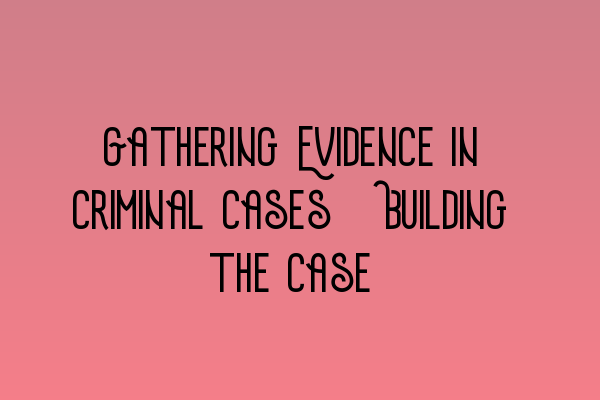Gathering Evidence in Criminal Cases: Building the Case
When it comes to criminal cases, the gathering of evidence is crucial for building a strong case. As solicitors at SQE Criminal Law & Practice Law UK, we understand the importance of thorough and effective evidence collection. In this blog post, we will discuss the process of gathering evidence in criminal cases and how it contributes to building a solid case.
The Importance of Evidence
Before we dive into the details, it is essential to understand why evidence plays a pivotal role in criminal cases. Evidence provides the necessary facts and information to support the claims made by the prosecution or defense. It helps establish the truth and enables the court to make informed decisions based on the available evidence.
Without proper evidence, a case may lack substance and credibility, making it challenging to achieve a favorable outcome. Effective evidence gathering ensures that all relevant facts are presented, allowing for a fair trial and a just resolution.
Types of Evidence
There are several types of evidence that can be presented in criminal cases. Each type serves a specific purpose and contributes to the overall strength of the case. Let’s take a closer look at some common types of evidence:
- Physical Evidence: Physical evidence refers to any tangible object or material that is relevant to the case. This can include weapons, documents, fingerprints, DNA samples, or any other physical trace left at the crime scene.
- Witness Testimony: Witness testimony involves statements made by individuals who have direct or indirect knowledge of the events related to the case. Their account of what they saw, heard, or experienced can provide valuable insight into the circumstances surrounding the alleged crime.
- Expert Opinion: Expert opinion refers to the testimony provided by qualified professionals who possess specialized knowledge in a particular field. Their expertise can help the court understand complex matters and draw conclusions based on scientific, technical, or specialized analysis.
- Documentary Evidence: Documentary evidence includes any written or recorded material that is relevant to the case. This can include contracts, financial records, emails, photographs, or any other document that supports or disproves a claim.
The Process of Gathering Evidence
Now that we have discussed the importance and types of evidence, let’s delve into the process of gathering evidence in criminal cases. This process involves several essential steps:
- Identifying Potential Evidence: The first step is to identify the potential sources of evidence. This may include crime scenes, witnesses, documents, or any other relevant information that can contribute to the case.
- Preserving the Evidence: Once potential evidence is identified, it is crucial to preserve it properly. This may involve photographing the crime scene, taking DNA samples, securing documents, or any other necessary actions to prevent tampering or loss of evidence.
- Collecting the Evidence: After preserving the evidence, it must be collected following proper protocols and techniques. This may involve using specialized tools, gathering witness statements, conducting interviews, or collaborating with experts to collect relevant data.
- Evaluating and Analyzing the Evidence: Once the evidence is collected, it needs to be evaluated and analyzed thoroughly. This involves scrutinizing each piece of evidence to determine its relevance, reliability, and potential impact on the case.
- Presenting the Evidence: Finally, the gathered evidence needs to be presented effectively in court. This requires careful planning and strategizing to ensure that the evidence is presented in a logical and compelling manner.
At SQE Criminal Law & Practice Law UK, we understand the intricacies of evidence gathering and its significance in criminal cases. Our team of experienced solicitors possesses the expertise required to collect, analyze, and present evidence effectively.
Conclusion
Gathering evidence plays a vital role in building a strong case in criminal law. From physical evidence to witness testimony and expert opinions, each piece of evidence contributes to establishing the truth and supporting the claims made in court. By following a diligent process of evidence collection, preservation, and evaluation, solicitors at SQE Criminal Law & Practice Law UK aim to ensure a fair trial and a just verdict.
If you’re interested in exploring more topics related to criminal law and practice, check out our insightful articles:
- Workshops and Seminars on Criminal Practice: Expanding Your Expertise
- Updates in UK Criminal Laws: Staying Informed and Prepared
- Mock Tests for SQE Criminal Practice: Exam Simulation for Success
- Enhancing Your SQE Criminal Law Study Group Experience
- Decoding Criminal Evidence Rules: A Detailed Analysis
